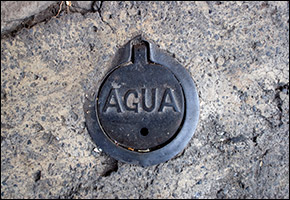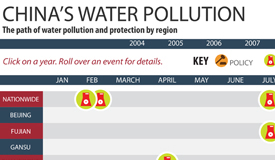Gas Execs Call for Disclosure of Chemicals Used in Hydraulic Fracturing
By Abrahm Lustgarten
ProPublica
Two prominent gas industry executives have directly addressed one of the key environmental concerns surrounding the expansion of natural gas development by calling for the disclosure of chemicals used in hydraulic fracturing.
The statements – made last week by Chesapeake Energy CEO Aubrey McClendon and Range Resources CEO John Pinkerton – came as the industry faces increasing pressure to be more forthcoming about the chemicals it uses. New York state recently released an environmental impact statement that specifically called for disclosure of the chemicals used in hydraulic fracturing. Colorado and several other states also have asked for that information.
At issue is whether hydraulic fracturing, and the chemicals it requires, might be responsible for water contamination incidents in drilling areas across the country. The process, which is currently exempt from federal oversight under the Safe Drinking Water Act, forces millions of gallons of water, mixed with sand and small amounts of chemicals, into the earth to break rock and release gas. Scientists, including some at the Environmental Protection Agency, have said they can’t thoroughly investigate the contamination incidents because the names of the chemicals are protected trade secrets.
At a panel discussion at the IHS Herold Pacesetters Energy Conference in Greenwich, Conn., McClendon told attendees that fracturing should be demystified, and that “we need to disclose the chemicals that we are using and search for alternatives,” according to an account of the discussion from Reuters. In other news reports, McClendon was quoted as saying he was concerned that undue fears about the drilling chemicals had bogged down efforts to open the Marcellus Shale, a mammoth natural gas deposit that lies beneath much of Ohio, West Virginia, Pennsylvania and New York.
Chesapeake and other gas producers subcontract fracturing services from companies that specialize in the process, including Halliburton, Schlumberger and BJ Services. In the past, those companies have said they are differentiated by the recipes they use for fracturing underground and that forced disclosure would erase any competitive advantage. But a Schlumberger spokesperson was recently quoted as saying the company is willing to discuss more disclosure.
At the energy conference, Pinkerton called the companies’ concerns that disclosure would put them at a disadvantage “silly” and said, according to a report in Natural Gas Intelligence, that “I’ve basically told them that this is not acceptable.”
Chesapeake and several gas industry associations already offer the public educational fact sheets that detail a few dominant ingredients in fracturing solutions, but the fact sheets don’t list all the ingredients or explain how they might be combined, information that environmental scientists say is critical to measuring the risk associated with fracturing fluids. It isn’t clear how much more McClendon and Pinkerton would favor disclosing.
“The question remains, what is that disclosure going to be?” said Amy Mall, a policy analyst for the Natural Resources Defense Council. “Is it going to be specifics that allow a health specialist or a hydrologist to analyze exactly what the risks are to human health? The devil is in the details.”
A Chesapeake spokesman declined to clarify McClendon’s statements, but in an e-mailed response said “the discussion about the types of additives used in minimal amounts during hydraulic fracturing is misguided since each additive that is brought onto a well location is accompanied by a Materials Safety Data Sheet, which not only identifies the materials but outlines proper ways in which to utilize them.” The MSDS sheets, which are available to the public, are required by law to provide information on how workers might be poisoned by chemicals – but they’ve also been criticized as providing only partial information.
Pinkerton, the Range Resources CEO, also declined to comment for this article, but a company spokesman said Pinkerton would like to see more information made public than is currently available. “We need to go further than where we have been so far,” said the spokesman, Matt Pitzarella. “We need to get it to a level where everyone is comfortable. In recent years, more and more of those chemicals are now organically based, and I think we need to get a movement towards more and more organically based chemicals.”
It remains to be seen whether service providers such as Halliburton, and the chemical manufacturers that supply them, will go along with a movement toward disclosure, as they are the ones with the most at stake. Neither Halliburton nor Schlumberger responded to requests for comment.
“When you start getting from the general to the specific, people may have considerations that aren’t reflected in those general statements,” said Lee Fuller, vice president for government relations for the Independent Petroleum Association of America. “We’ve been having conversations with our members about chemical disclosure and types of disclosure and proprietary information for months if not longer.”
A series of reports from ProPublica in the past year have documented numerous cases in which gas drilling and the handling of the fluids it requires have led to water contamination. In response to those concerns, New York state put a moratorium on new drilling in the prized Marcellus Shale gas deposit, and hydraulic fracturing has become a hot button issue across the country.
Political pressure has also been building.
The day before the two executives spoke in Connecticut, a bipartisan group of senators urged their colleagues to include a study of the environmental impacts of fracturing in the energy and climate bill being considered by Congress.
In June, members of the House and Senate also weighed in on the subject, introducing twin bills that would give the EPA authority to regulate fracturing under the Safe Drinking Water Act and mandate disclosure of the chemicals used in the fracturing process. The energy industry is fighting the legislation, known as the Frac Act, and it has languished since summer.
Gwen Lachelt, director of the Oil and Gas Accountability Project, an environmental advocacy group based in Durango, Colo., thinks the executives’ statements show how eager they are to put environmental controversies behind them.
“There is a lot of horse trading going on right now,” Lachelt said. “I don’t think it’s any coincidence that we are hearing from companies about their willingness to disclose and the timing of this letter from the senators.”
Fuller, of the Independent Petroleum Association of America, said that if a study of fracturing is included in the climate bill, it would “diminish any interest in moving forward on the Frac Act.”
Not so, said Kristofer Eisenla, deputy chief of staff for one of the bill’s main sponsors, Rep. Diana DeGette, D-Colo., who supports both the study and the disclosure but would also like to see a regulatory framework for addressing the fracturing process.
“Just because they are coming around to see the light of day on this and starting to agree with us doesn’t mean we are going to fold up and go home,” he said. “It does validate what we are trying to do here.”
This report comes to Circle of Blue from ProPublica, an independent, non-profit newsroom based in Manhattan that produces investigative journalism in the public interest.

Circle of Blue provides relevant, reliable, and actionable on-the-ground information about the world’s resource crises.









Leave a Reply
Want to join the discussion?Feel free to contribute!